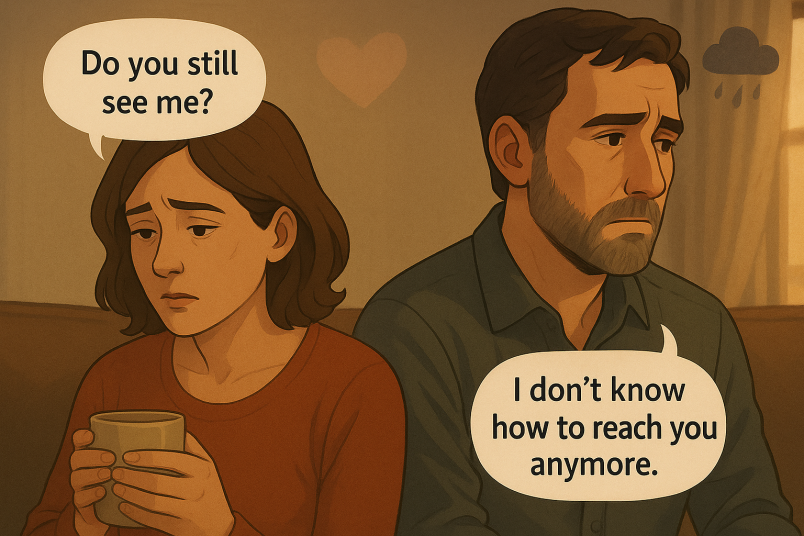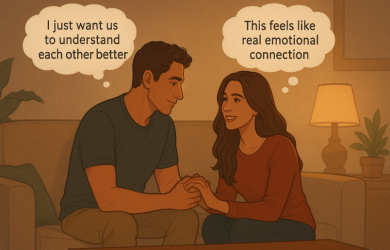11 Things to Do When Your Emotional Needs Aren’t Being Met

Heal & Grow Daily for a Happier Relationship
Subscribe FREEKey Takeaways
Marriage.com AI Quick Summary
It’s a strange ache, isn’t it—when you feel present in a relationship, yet somehow… unseen. You might laugh together, share routines, even care deeply, but deep down there’s a quiet emptiness you can’t shake.
Maybe it shows up as frustration over small things, or a heaviness you carry alone; maybe it’s the subtle pull to withdraw. Emotional Needs aren’t loud demands—they’re the quiet ways we ask to be valued, understood, and cherished.
And when they’re not met, it can leave you questioning yourself, the connection, and even your worth… yet there’s still a way to find your footing again.
What are emotional needs in a relationship?
Emotional needs aren’t loud demands—they’re the quiet ways we ask to be valued, understood, and cherished. And when they’re not met, it can leave you questioning yourself, the connection, and even your worth… yet there’s still a way to find your footing again.
A research paper published in 2001 states that individuals who perceive their emotional needs as being fulfilled in their romantic relationship report more positive and fewer negative emotions and needs day to day.
Here are some of the types of emotional needs in a relationship
- Affection and physical touch: Small gestures like hugs, hand-holding, or a gentle pat on the back help partners feel physically connected and reassured, fulfilling one of the most basic emotional needs.
- Validation and understanding: Feeling truly heard and acknowledged when you share your thoughts or emotions strengthens trust and reduces feelings of isolation.
- Quality time: Uninterrupted, meaningful time together—whether it’s a date night or a simple walk—nurtures intimacy and shows you value each other’s presence.
- Support and encouragement – Having a partner who stands by you during challenges and celebrates your wins makes emotional needs in a relationship feel consistently met.
- Respect and appreciation – Mutual respect and regular expressions of gratitude foster security and keep the relationship feeling balanced and valued.
For example: Imagine one partner consistently listening with empathy after a stressful day. That small, attentive act doesn’t just solve problems—it builds a safe space where both partners feel heard and understood, reinforcing the bond over time.
Please note:
If your emotional needs aren’t being met, it doesn’t mean you’re “too much” or unworthy. It simply means there’s room for deeper connection, healthier communication, and mutual care—things every person deserves in a relationship.
5 signs that indicate unmet emotional needs
It’s normal for emotional needs to ebb and flow in a relationship, but when they consistently go unmet, it can take a toll on your connection and well-being. Knowing the warning signs helps you address them early and work toward a healthier, more fulfilling bond.
1. You feel emotionally distant from your partner
When emotional closeness fades, you may find yourself feeling like strangers despite living or spending time together. Conversations become surface-level, and meaningful exchanges are rare. This distance can make you feel unseen or disconnected. Recognizing it is the first step toward rebuilding intimacy and trust.
2. You feel unheard or misunderstood
If your thoughts and feelings are dismissed or misinterpreted often, it can leave you feeling invisible. Healthy relationships require both partners to listen and validate each other. When this is missing, it creates frustration and hurt. Feeling understood is a core part of having your emotional needs met.
3. You no longer feel valued or appreciated
Lack of recognition for your efforts—whether in small gestures or big contributions—can signal unmet needs. Without appreciation, resentment may grow over time. This can make everyday interactions feel heavy. Feeling valued keeps emotional needs in a relationship alive and fosters mutual respect.
4. You avoid sharing your true feelings
Withholding your emotions and needs to “keep the peace” or avoid conflict is a clear warning sign. Over time, this habit can create emotional walls. A healthy partnership should feel safe enough for honest sharing. If it doesn’t, the relationship needs more emotional openness.
5. You seek emotional support elsewhere
When a partner can’t or won’t meet your emotional needs, you might turn to friends, family, or even strangers for comfort. While outside support is healthy, relying on it for core relationship fulfillment signals a deeper issue. This gap should be addressed directly and compassionately.
11 things to do when your emotional needs aren’t being met
It’s not always easy to admit when something feels “off” in your connection with someone you care about. When emotional needs go unmet, it can create distance, frustration, or even self-doubt.
Understanding emotional needs in a relationship isn’t about being demanding—it’s about recognizing what helps you feel valued, supported, and seen. These small but important shifts can help you move from feeling overlooked to feeling emotionally connected again.
1. Figure out what makes your cup runneth over
We all have different emotional ways of expressing (think less French, more understanding of how you feel loved).
According to Grady Shumway, LMHC:
When you know what fills your emotional cup, you can better communicate your needs and create space for love that actually feels like love.
Do you crave words of affirmation? Quality time cuddled on the couch? Grand gestures that would make a rom-com blush? Getting clear on what makes you feel seen and cherished is key to the next step.
- Example: Maybe you realize that hearing “I’m proud of you” after a long day means more to you than any bouquet of flowers.
2. Talk it out
Remember that fight scene in your favorite movie where everyone’s yelling but nobody’s listening? Yeah, not that.
In marriages, some spouses hold back their emotions to avoid conflicts and keep the relationship stable. However, past research mostly highlights the negative impact this can have on intimacy.
Open communication is key, but aim for a calm, “I feel” approach instead of a finger-pointing blame game.
- Example: Instead of saying “You never listen,” try “I feel unheard when I’m talking about my day and you’re on your phone.”
3. Become a master listener
Communication is a two-way street (and yes, it can be way more frustrating than rush hour traffic sometimes). Listen to your partner’s perspective with an open mind (and maybe a silent “wow, really?” if needed).
This shows you care about their feelings too, and might just lead to some “aha!” moments for both of you.
- Example: If your partner says they feel disconnected when you work late, repeat back, “So you feel lonely when I’m not home for dinner?” to show you get it.
4. Consider bringing in the relationship referees
Sometimes, you need a neutral third party to help navigate the emotional battlefield. A couples therapist can act as a guide, offering tools and strategies to help you both understand and fulfill each other’s needs.
- Example: A therapist might suggest weekly check-ins where you each share one thing you appreciated about the other that week.
5. Fill your own cup
Self-care isn’t selfish, it’s self-defense! When your emotional tank is running low, take a bubble bath, call your bestie, or do that thing that makes you feel like Beyoncé. A happy you is a better you (and a better partner, too).
- Example: If you’ve been stressed for days, a solo hike or painting session might help you recharge before reconnecting with your partner.
6. Set boundaries like a boss
Boundaries are basically your personal emotional guardrails.
Grady Shumway highlights that:
Boundaries aren’t about building walls; they’re about showing up for yourself so you can show up better for each other.
Let your partner know what’s okay and what’s not (think constantly canceling date night for video games – not cool). Boundaries help protect your well-being and keep the relationship healthy.
- Example: You could say, “I’m okay with you gaming on weekends, but I’d like us to keep Friday nights for just us.”
7. Rekindle the spark
Feeling emotionally distant? Plan a surprise picnic, have a game night, or recreate your first date (minus the awkward middle school jokes).
A research paper published in 2000 states that couples who engage together in novel, exciting activities—rather than routine, mundane ones—consistently report higher relationship quality, less boredom, and more positive connection outcomes
Doing things together can help you reconnect and remember why you fell for each other in the first place.
- Example: If you met at a coffee shop, revisit it and order the same drinks you had back then—nostalgia can be magic.
8. Take a relationship temperature check
Is this a temporary blip or a full-on emotional ice age? Regularly assess the overall health of your relationship. Understanding the root of the problem can help you decide how to move forward.
- Example: You might notice that stress at work is causing tension, which could mean the issue is situational, not permanent.
9. Lean on your crew
Sometimes, you just need a good vent sesh with your besties. Talking to supportive friends and family can give you a different perspective and remind you that you’re not alone.
- Example: After a long talk with a trusted friend, you might realize your frustration stems from unmet expectations you never voiced.
10. Talk to a therapist
If you’re feeling stuck, individual therapy can be a powerful tool. A therapist can help you understand your emotions, develop healthy coping mechanisms, and make informed decisions about your relationship.
- Example: Your therapist might help you uncover patterns from past relationships that are influencing your current emotional needs.
Watch this TED Talk by Alexis Powell‑Howard, a psychotherapist, who shares how therapy works—breaking myths, explaining what actually happens in a session, and how it supports emotional growth and transformation.
11. Keep learning about each other
Relationships aren’t static—they grow, shift, and change as you both do. What made your partner feel loved last year might not be the same today, and vice versa. Keep checking in, asking questions, and discovering new ways to show up for each other.
- Example: Maybe your partner used to love spontaneous road trips, but now they crave quiet evenings at home—understanding these shifts helps meet emotional needs in a relationship as it evolves.
How to take care of your emotional well-being
Taking care of your emotional well-being isn’t just about avoiding stress—it’s about actively nurturing the thoughts, habits, and relationships that keep you feeling grounded and supported. When you prioritize yourself emotionally, you’re better able to show up for others and keep your own life feeling balanced and fulfilling.
- Practice self-awareness – Check in with your feelings daily. Understanding what you’re feeling and why helps you respond to challenges with clarity rather than reacting impulsively.
- Set healthy boundaries – Protect your energy by saying no when needed. Boundaries are essential for meeting your emotional needs and preventing burnout.
- Stay connected to supportive people – Surround yourself with friends or family who encourage and uplift you. Positive connections help maintain emotional stability and a sense of belonging.
- Engage in activities that bring joy – Whether it’s painting, hiking, or cooking, hobbies provide a sense of fulfillment and recharge your emotional battery.
- Communicate openly in relationships – Honest conversations about your needs strengthen trust and understanding, which is vital for sustaining emotional needs in a relationship.
FAQ
When your heart feels a little neglected, it’s natural to have questions—about what’s normal, what’s not, and how to bridge the gap. These questions dives into common concerns around emotional needs in a relationship, giving you clear, reassuring guidance to help you feel more connected and understood.
-
How can emotional needs vary between individuals?
Emotional needs can vary based on personality, past experiences, and individual preferences. What makes one person feel loved might be different for another. Understanding these differences is key to meeting each other’s needs effectively.
-
What happens if your needs are not met in a relationship for a long time?
If your emotional needs are not met for a long time, you may feel neglected, unhappy, and disconnected from your partner. This can lead to resentment and weaken the relationship. Addressing unmet needs is crucial for maintaining a healthy bond.
-
Can unmet emotional needs affect physical health?
Yes. Prolonged stress from unmet emotional needs can contribute to issues like fatigue, sleep problems, weakened immunity, and even heart health concerns—showing how deeply emotional well-being and physical health are connected.
Taking care of your needs
When emotional needs go unmet, it can feel isolating, frustrating, and even confusing—but it’s not a dead end. Relationships are living, breathing connections that can grow stronger with awareness, open communication, and mutual effort.
By identifying what you need, expressing it clearly, and caring for your own well-being, you create space for deeper connection and trust. Remember, meeting emotional needs in a relationship is not about perfection—it’s about showing up for each other consistently, with understanding, respect, and genuine care.
 Tips
Tips
Write your tip or submit a video tip
All tips are reviewed before the publishing.
Share this article on
Recent Articles
Related Quizzes
Heal & Grow Daily for a Happier, Healthier Relationship
Subscribe FREE on YouTube We'd love your feedback!
We'd love your feedback!
 Expert Q&A
Expert Q&A
Ask your question related to this topic & get the support you deserve from experts.





















 Thanks for your feedback!
Thanks for your feedback!